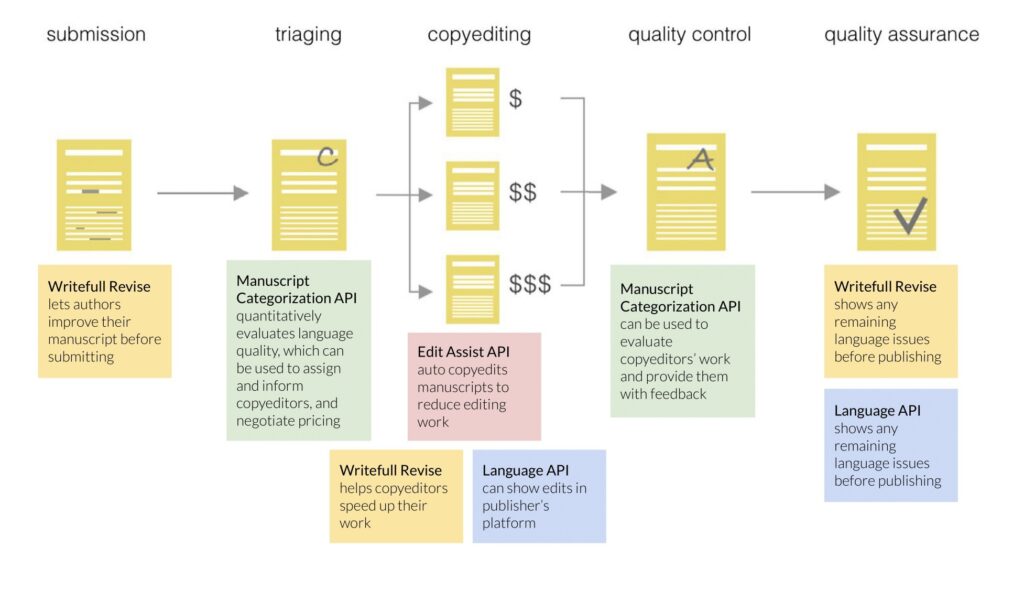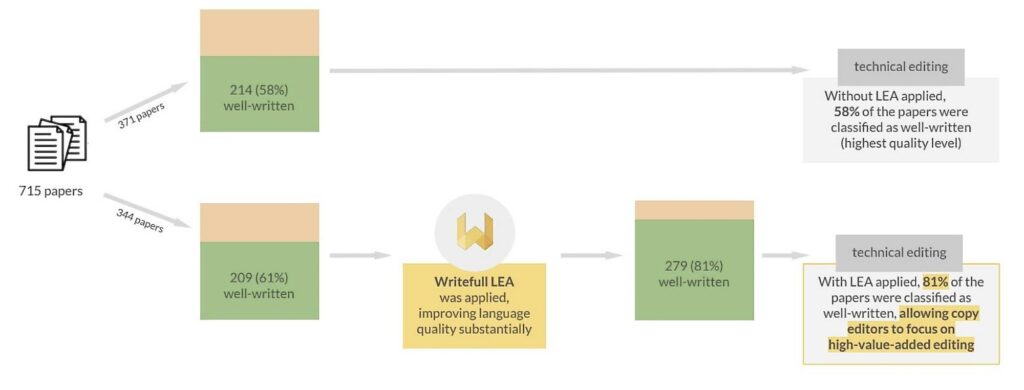
Writefull Case Study
One of the world’s largest scientific societies and the premier home of chemistry professionals publishes over 80 journals spanning all disciplines of the chemical sciences.
The society’s Production Operations team is responsible for tasks like technical editing and proof review. As the organization grew, it needed more capacity, and they now leverage a global supply chain – including Writefull.
The team is also involved in developing and implementing new technologies, with a particular focus on how to make the best use of Artificial Intelligence. They looked into the concept of language modification done programmatically but were “really striking out with commercially available broad-sweeping tools. They did not perform well on our content.” What they needed was something that could suggest improvements to academic language usage, such as sentence structures in scientific writing or discipline-specific vocabulary.
Supporting the entire publishing workflow
Then the organization was introduced to Writefull. They were immediately intrigued by the specificity it offers, as Writefull’s models can be tailored to a particular niche of scientific content. After a competitive RFP process, they decided to work with Writefull, and together they began developing some of the services they have since operationalized.
Writefull’s full publisher solution offering supports each stage of the publishing pipeline, from submission to copy editing to quality assurance:

Over the years, the society has incorporated four unique tools from Writefull. A member of the Production Operations team explains: “We have a very rigorous method for evaluating the quality of each step of the production process. For example, one of the things we need to do when we evaluate quality involves scoring the language after copyediting. Traditionally, it would take a long time for one of our team members to complete a review like this, limiting the amount of content that could undergo quality review. But when we tailored Writefull’s Manuscript Categorization API to our requirements and benchmarked it against our own quality analysts, it reached over 95% alignment in categorising texts.” With such a high level of alignment, the automation of this task can significantly reduce the time spent on manuscript evaluation and allow more content to be reviewed for quality purposes.
The organization’s quality evaluation program also includes assessment of metrics such as whether author names and affiliations are present and correct. They use Writefull’s Metadata API to facilitate and partly automate this task, by extracting manuscript elements for post-editing quality assessment. This reduces the number of items in their quality evaluation that need manual review and the time spent reviewing them.
Another API they have adopted is Language Edit Assist (LEA), which auto-applies a highly customized subset of Writefull’s language edits to manuscripts prior to copyediting. The manuscript is then at a better starting point when it reaches the copyeditor, increasing efficiency in the editing process.
A transformative step
Writefull’s services have delivered multiple benefits to the society – including demonstrable time and cost savings.
A prime example comes from its recent analysis of LEA results. 715 papers were randomly split into two workflows, with manuscripts of similar language quality levels present in each workflow. Prior to technical editing, one group had automatic edits applied by Writefull’s LEA service and the other group did not. Without LEA applied, 58% of the papers were classified as well-written (the highest quality level). But with LEA applied, 81% of the papers were classified as well-written – enabling the organization’s copyeditors to focus their time on high-value-added edits, instead of on basic grammatical fixes, such as articles, punctuation, and conjunctions.

Additionally, editors at the society evaluated 35,000 individual edits made by LEA. After refinement using internal data, edits applied without error were 99.04%, and edits introducing errors were 0.96% – showing a high level of accuracy.
“It has been transformative,” says a member of the Production Operations team. “The data we’ve obtained has really been useful because it’s highly customized to our work. Having quality information at the right time is so important, and there’s a limit to what human manual efforts can do and when they can do it. Being able to do it programmatically with a high degree of accuracy gives you a wealth of data – and that means you get new insights into how you’re operating the business and the strategic directions you should consider.”
From strength to strength
There has been a high degree of adoption, and the society and Writefull are working together to refine the processes further.
They are now looking ahead at what this adoption and their new knowledge means for operational performance: “Is there some opportunity there for improving throughput or quality? What are the key metrics that this is going to impact? The next part is to manage that forward. We’re seeing the refinements boost the tools’ overall performance and increase staff buy-in further.”
Part of the project’s success is attributed to how well the organization and Writefull work together. Juan Castro, CEO and Co-founder of Writefull, reflects: “Many of the services we offer to publishers today are the fruits of our collaboration with this society. It is together that we have identified challenges, thought of solutions, and developed and vetted new technologies. I personally think LEA is the most exciting of all—it is such a powerful solution, which offers direct assistance. We look forward to many more future projects together.“
The society has found Juan and the wider Writefull team to be “very creative and collaborative, and they’ve really been engaged in coming up with innovative ways to overcome the challenges involved and achieve our goals. They’re a fantastic group to work with.”
If you’d like to explore how Writefull’s services could support your organization, request a demo.



